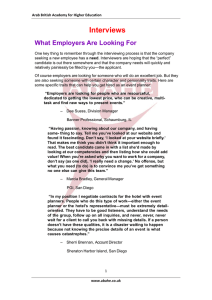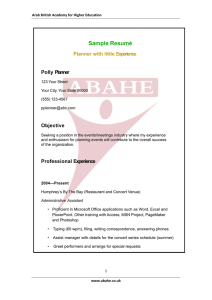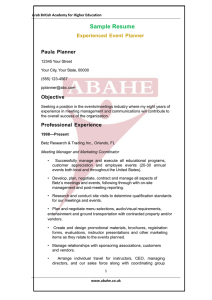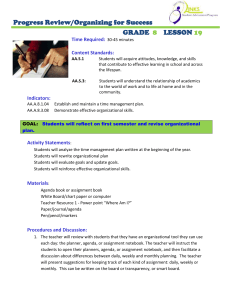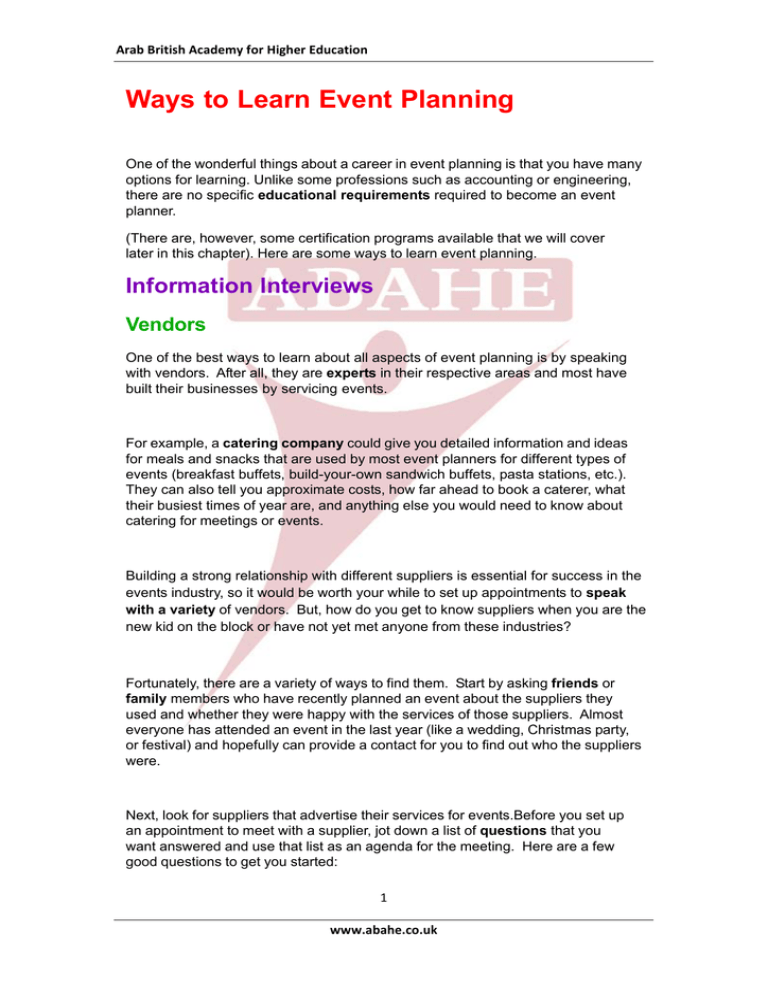
Arab British Academy for Higher Education Ways to Learn Event Planning
One of the wonderful things about a career in event planning is that you have many
options for learning. Unlike some professions such as accounting or engineering,
there are no specific educational requirements required to become an event
planner.
(There are, however, some certification programs available that we will cover
later in this chapter). Here are some ways to learn event planning.
Information Interviews
Vendors
One of the best ways to learn about all aspects of event planning is by speaking
with vendors. After all, they are experts in their respective areas and most have
built their businesses by servicing events.
For example, a catering company could give you detailed information and ideas
for meals and snacks that are used by most event planners for different types of
events (breakfast buffets, build-your-own sandwich buffets, pasta stations, etc.).
They can also tell you approximate costs, how far ahead to book a caterer, what
their busiest times of year are, and anything else you would need to know about
catering for meetings or events.
Building a strong relationship with different suppliers is essential for success in the
events industry, so it would be worth your while to set up appointments to speak
with a variety of vendors. But, how do you get to know suppliers when you are the
new kid on the block or have not yet met anyone from these industries?
Fortunately, there are a variety of ways to find them. Start by asking friends or
family members who have recently planned an event about the suppliers they
used and whether they were happy with the services of those suppliers. Almost
everyone has attended an event in the last year (like a wedding, Christmas party,
or festival) and hopefully can provide a contact for you to find out who the suppliers
were.
Next, look for suppliers that advertise their services for events.Before you set up
an appointment to meet with a supplier, jot down a list of questions that you
want answered and use that list as an agenda for the meeting. Here are a few
good questions to get you started:
1 www.abahe.co.uk Arab British Academy for Higher Education • What types of events does your company specialize in?
• What types of products do you carry?
• Do you have access to products that you don’t normally carry?
• How much lead time do you require?
• How much deposit is required and when is it payable?
• When is the final payment due?
• What is your cancellation policy?
• Do you offer discounts to industry professionals (i.e. event planners)?
• Do you have a standard contract in place?
• What types of crisis situations have you seen happen and how were
they handled?
• What is your best advice for a novice event planner?
Event Planners
One of the best ways to find a busy event planner to interview is through a
personal referral. Ask your network of contacts if they know anyone who works in a
job that involves planning meetings or events. If possible, go beyond getting a
name and telephone number. Ask the individual who personally knows the event
planner to contact them, explain that you are learning about event planning, and
see if you can call them to ask a few questions.
If no one in your network knows anyone who is an event planner, you can try
arranging a meeting with a cold call. Grab the Yellow Pages and start dialing. Explain
that you are studying event planning and ask if you can arrange to meet with them for
20 minutes to ask a few questions. People are much more likely to agree to a
meeting if they know it won’t take too much time.
2 www.abahe.co.uk Arab British Academy for Higher Education TIP:
Although you are conducting an “information
interview,” it may be better to avoid using that term
when you first call.
Many professionals assume someone who wants to set up
an information interview is actually looking for a job, not
simply looking to learn about the profession. So they may
decline to meet with you if they do not have any current
job openings. Instead, it may be better to say that you are
doing research.
Be prepared that the event planner may not be available for a personal meeting but
may be willing to answer questions on the phone or by email. If they make such an
offer, take them up on it! If you’re sending an email, you’re more likely to get a
response if it is limited to only a few key questions.
If the event planner agrees to a personal meeting, arrive on time and come prepared
with a list of questions. At the 20-minute mark, acknowledge that your time is up,
say you know they are busy, and offer to leave. If the event planner doesn’t have
another appointment, they may be happy to extend the meeting. (If you want to
make a good impression, it’s usually not a good idea to stay longer than agreed
without permission.)
After asking and learning about what types of events the event planner organizes,
you can ask about any area that you would like to learn more about. For example:
• How do you get people to attend your events?
• Which vendors do you work with?
• What are some challenges you’ve experienced and how did you handle
them?
• What advice do you have for getting corporate sponsorships?
While owners of event planning businesses may also be willing to speak with you,
be aware that they probably will not be eager to help if you start a competing
business in
the same locality. However, if you are going into a niche they do not serve, they might
be more willing to tell you how they built their business.
After the Interview
3 www.abahe.co.uk Arab British Academy for Higher Education Whenever someone takes time to assist you, make sure you thank them. Send a
thank-you note to the person you interviewed and, if someone referred you, thank
that person as well. If you make a good impression, it might lead to future
opportunities such as an internship or even a job.
All Rights Reserved © Arab British Academy for Higher Education
4 www.abahe.co.uk

